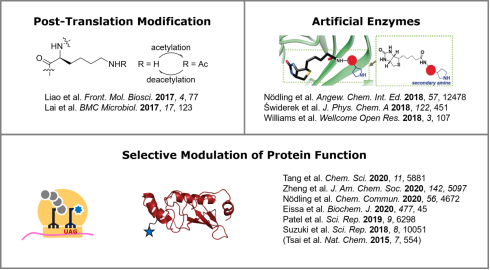
Principal Investigator
Biochemistry & Molecular Biology
tsai(at)szbl.ac.cn
2020- PresentShenzhen Bay Laboratory Junior Principal Investigator
2015 - 2020Cardiff University Lecturer
2012 - 2014MRC Laboratory of Molecular Biology Postdoctoral Researcher
2009 - 2012Freie Universität Berlin Doctor of Natural Science
2007 - 2008Swiss Federal Institute of Technology Zurich Master of Science
2006 - 2007Academia Sinica Research Assistant
2003 - 2006National Taiwan University Bachelor of Science
Our research focuses on development of new chemical biology tools that address challenging biological questions. We are particularly interested in developing new tools to control protein function and their biomedical applications, such as therapeutics and diagnostics. The group has expertise in chemical biology, organic synthesis, therapeutic development, gene editing, and genetic code expansion.

Yu-Hsuan Tsai did undergraduate study at the National Taiwan University and obtained his BSc with Honors in 2006. He then worked as a research assistant on isolation, characterization, and synthesis of bacterial glycoconjugates in the group of Shih-Hsiung Wu in the Institute of Biological Chemistry at the Academia Sinica. He later joined the group of Peter Seeberger at the Swiss Federal Institute of Technology (ETH) Zurich in 2007 and moved with the group to Max Planck Institute of Colloids and Interfaces in 2009. During this time, he worked on different aspects of carbohydrate research, including carbohydrate dendrimers, carbohydrate-antibody interactions, synthetic inositol phosphoglycans as insulin mimetics and total synthesis of glycosylphophatidylinositol anchors. In 2012 he joined the group of Jason Chin at the MRC Laboratory of Molecular Biology working on genetic code expansion and its applications in mammalian cells.
In 2015, Dr Tsai established his independent research group in the School of Chemistry at Cardiff University. He has secured over £2.4 million research funding. To date, he has published 26 peer-reviewed papers (13 as an independent researcher), including articles in Nat. Chem., J. Am. Chem. Soc., Angew. Chem. and Chem. Sci. Published works from his lab have been reported as feature news by various agents, such as Science, The Conversation, etc. He is also a co-inventor of two patents and a recipient of different distinctions, such as Cardiff Futures (2019), British Science Association Media Fellow (2018), GW4 Crucible (2017), EMBO Fellow (2014), MCR Career Development Fellow (2012). He has also been an Academic Editor of PLOS ONE since 2020.
• 2001, Dow Chemical Award
• 2001, Chinese Chemical Society Award
• 2006, National Taiwan University Dean of Science Award
• 2007, ETH Zurich Scholarship
• 2008, Novartis Master Fellowship
• 2009, DAAD Scholarship
• 2011, European Science Foundation Student Grant
• 2012, Max Planck Institute Scholarship
• 2012, MRC Career Development Fellowship
• 2013, EMBO Long-Term Fellowship
• 2017, GW4 Crucible
• 2018, British Science Association Media Fellowship
• 2019, Cardiff Futures
1. Y. Huang, C. Wu, A. Lu, J. Wang, J. Liang, H. Sun, L. Yang, S. Duan, A. A. Berezin, C. Wu, B. Zhang, Y.-L. Wu, Y.-H. Tsai, A single bioorthogonal reaction for multiplex cell surface protein labelling. J. Am. Chem. Soc. 2025, 147, in press.
2. T. L. Williams, I. M. Taily, L. Hatton, A. A. Berezin, Y.-L. Wu, V. Moliner, K. Świderek, Y.-H. Tsai, L. Y. P. Luk, Secondary amine catalysis in enzyme design: broadening protein template diversity through genetic code expansion. Angew. Chem. Int. Ed. 2024, 63, e202403098.
3. L. A. Spear, Y. Huang, J. Chen, A. R. Nödling, S. Virdee, Y.-H. Tsai, Selective inhibition of cysteine-dependent enzymes by bioorthogonal tethering. J. Mol. Biol. 2022, 434, 167524.
4. X. Zheng, Z. Li, W. Gao, X. Meng, X. Li, L. Y. P. Luk, Y. Zhao, Y.-H. Tsai, C. Wu, Condensation of 2-((alkylthio)(aryl)methylene)malononitrile with 1,2-aminothiol as a novel bioorthogonal reaction for site-specific protein modification and peptide cyclization. J. Am. Chem. Soc. 2020, 142, 5097.
5. Y.-H. Tsai, S. Essig, J. R. James, K. Lang, J. W. Chin, Selective, rapid and optically switchable regulation of protein function in live mammalian cells. Nat. Chem. 2015, 7, 554.